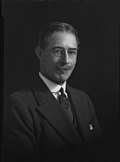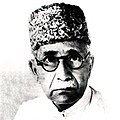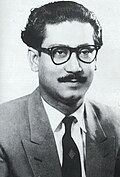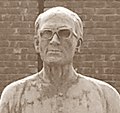Top Qs
Timeline
Chat
Perspective
List of office-holders in the Government of Bangladesh
From Wikipedia, the free encyclopedia
Remove ads
This is a list of current office holders in various fields of the Government of Bangladesh.
This article needs to be updated. (November 2024) |
The President of Bangladesh is the Head of State of Bangladesh. Since 1991, Bangladesh is a parliamentary democracy. This makes the President a mostly ceremonial post elected by the parliament.[1] The President lives at the Bangabhaban Palace which is his office and home.
Remove ads
East India Company governors in Bengal
Summarize
Perspective
Governors of British East India Company in Bengal (1757–1793)
- Robert Clive 1757 – 1760
- Henry Vansittart 1760 – 1764
- Robert Clive (again) 1765 – 1766
- Harry Verelst 1767 – 1769
- John Cartier 1769 – 1772
- Warren Hastings 1772 – 1773 see below
As per the treaty of Allahabad in 1765, the British East India Company (BEIC) was given the right to collect revenue (Diwani right). From 1769, the company collected revenue from Bengal.
Governor-Generals of British East India Company in Bengal - Dual government (1773-1774)
Following the Regulating Act of 1773, the Governor of Bengal was officially called Governor-General of Fort William.
- Warren Hastings 1773 see above – 1774
- Charles Cornwallis 1786 – 1793
Governor-Generals of British East India Company in Bengal (1793–1854)
In 1793, the British East India Company abolished Nizamat, i.e. local rule by Mughal emperor- appointed Nawabs and annexed Bengal.
- Sir John Shore 1793 - 1798
- Richard Wellesley 1798 – 1805
- Charles Cornwallis 1805 – 1805
- Sir George Barlow, 1st Baronet 1805 - 1807
- Gilbert Elliot-Murray-Kynynmound, 1st Earl of Minto 1807 - 1813
- Francis Rawdon-Hastings, 1st Marquess of Hastings 1813 - 1823
- John Adam 1823 - 1823
- William Amherst, 1st Earl Amherst 1823 - 1828
- William Butterworth Bayley 1828 - 1828
- Lord William Bentinck 1828 - 1833
Governor-Generals of British East India Company (1833-1858)
As per Charter Act of 1833, the Governor-General of Bengal would be called Governor-General of India
- Lord William Bentinck 1833 - 1835
- Charles Metcalfe, 1st Baron Metcalfe 1835 - 1836
- George Eden 1836 - 1842
- Edward Law 1842 - 1844
- William Bird 1844 - 1844
- Henry Hardinge 1844 - 1848
- James Broun-Ramsay 1848 – 1856
- The Viscount Canning 1856 - 1858
Remove ads
British Raj Period
Summarize
Perspective
With the establishment of the Empire of India in 1858, the position of Governor-General was replaced with Governor-General and Viceroy of India. Calcutta, the capital of Bengal also became the capital of India. As a result, the position of Lieutenant-Governor of Bengal was established to look after provincial matters.
Lieutenant-Governors (1858–1912)
Governors (1912–1947)
In late 1911, the Indian Government decided to move the capital to New Delhi. As a result, the Governorship of Bengal Presidency was now necessary.
Remove ads
List of prime ministers of Bengal (1937–1947)

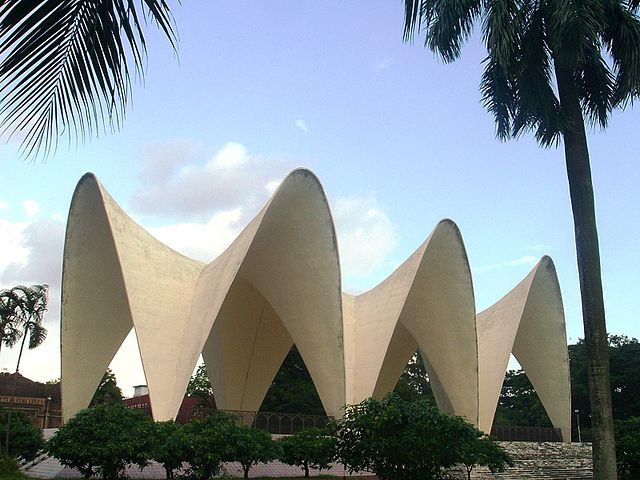
Pakistan Period
Summarize
Perspective
Governors
Political Party
Legend
Acting Governor
Chief ministers
Political Party
Remove ads
List of heads of state of Bangladesh
Summarize
Perspective
- Political parties
- Other affiliations
- Status
Acting president
- Symbols
† Died in office
Remove ads
List of prime ministers
Summarize
Perspective
There have been ten prime ministers, one senior minister, five chief advisers, and one acting chief adviser of Bangladesh.
Note that prime ministers are numbered either bracketless or with ( ) brackets, and chief advisors are numbered using [ ] brackets. Acting officeholders are not numbered and instead denoted with —.[32]
- Political parties
- Other affiliations
- Status
Acting prime minister
- Symbols
† Died in office
Remove ads
List of speakers and deputy speaker
- Political parties
Speakers
Deputy speakers
Remove ads
List of chief justices of Bangladesh
Summarize
Perspective
Remove ads
List of Chief Election Commissioners of Bangladesh
Summarize
Perspective
The following have held the post of the Chief Election Commissioner of Bangladesh.[51]
Remove ads
Bangladesh Public Service Commission Chairpersons
Summarize
Perspective
List of chairpersons:[54]
Remove ads
Anti-Corruption Commission (Bangladesh)
The Chairmen of the Anti-Corruption Commission are as follows:
- Sultan Hossain Khan (23 February 2004 – 8 February 2007)
- Hasan Mashhud Chowdhury (22 February 2007 – 2 April 2009)
- Ghulam Rahman (1 May 2009 – 23 June 2013)
- M Badiuzzaman (24 June 2013 – 6 March 2016)
- Iqbal Mahmood (14 March 2016 – 9 March 2021)
- Mohammad Moinuddin Abdullah (10 March 2021 – 29 October 2024)[58]
- Mohammad Abdul Momen (12 December 2024 – present)[59]
Remove ads
List of comptrollers and auditors general
On 11 May 1973, the first comptroller and auditor-general was appointed by the government of Bangladesh.[60] Since then there were 12 people who led office of the comptroller and auditor general of Bangladesh. A list is given below including the running CAG-
List of Attorney General of Bangladesh
Constitutional Office
List of Leaders of the House
Summarize
Perspective
Leader of the House (Bangladesh)
- Political parties
List of leaders of the opposition in Jatiya Sangsad
Summarize
Perspective
There was no opposition leader in the 1st and the 6th Parliament.[69]
Chief Whip (Bangladesh)
Parliament
List of defence secretaries
List of foreign ministers
List of ministers, advisers and state ministers
Finance Ministers
Ministers of Law, Justice and Parliamentary Affairs
Education Ministers
Summarize
Perspective
Ministry of Information and Broadcasting
Cabinet Ministers
This section needs to be updated. (November 2024) |
List of Cabinet Secretaries
The position holder is accountable for ensuring that the Civil Service is equipped with the skills and capability to meet the everyday challenges it faces and that civil servants work in a fair and decent environment.
Prime Minister's Office
List of Foreign Secretaries
Ministry of Home Affairs
List of Finance Secretaries
Ministry of Public Administration
Ministry of Public Administration
Bureaucrats
Defence and Security
Chief of Army Staff Appointees
Summarize
Perspective
The following table chronicles the appointees, to the office of the Chief of Army Staff or its preceding positions since the independence war of Bangladesh.[81][82][83]
Commander-in-Chief, Mukti Bahini (1971–1972)
Chief of staff, Mukti Bahini (1971–1972)
Chiefs of Army staff (1971–present)
Source:[85]
Chief of General Staff
Chief of General Staff (CGS) (Bengali: চীফ অব জেনারেল স্টাফ) of the Bangladesh Army is the head of operations, training and intelligence of the Bangladesh Army, he also performs important role in buying military equipment.[86][87] The Chief of General staff has been a three-star rank since 2007.[88][89]
List of Chiefs of Air Staff
Chief of the Naval Staff Appointees
Summarize
Perspective
The following table chronicles the appointees to the office of the Chief of the Naval Staff since the independence of Bangladesh. Prior to 2016, from 2007 the appointment was held by a Vice Admiral (three-star naval officer) and from 1972 to 2007 CNS's rank was Rear Admiral.
List of all Chief of Naval Staff of Bangladesh Navy:[92]
Principal Staff Officer (Bangladesh) Appointees
Summarize
Perspective
The following table chronicles the appointees to the office of principal staff officer.
Director General of Border Guard Bangladesh
List of Director General (DG) of Directorate of Forces Intelligence (DFI)
Inspector General of Police (Bangladesh)
Summarize
Perspective
The Chief of Bangladesh Police is an Inspector General, which is the only three star rank of Bangladesh Police. This is a list of Inspector Generals of Police since 1947, the inception of Bangladesh as East Pakistan.[106]
Notes
- A.S.M. Akram was appointed Acting Governor during the leave of absence of Sir Frederick Chalmers Bourne
- Abdur Rahman Siddiqui was appointed Acting Governor during the leave of absence of Feroz Khan Noon
- With the dismissal of the United Front Ministry in East Bengal, Governor General Malik Ghulam Muhammad decided to enforce Governor's Rule in the province and appointed Iskander Mirza as Governor
- Thomas Hobart Ellis was appointed acting Governor when Iskander Mirza was taken into the central cabinet as Minister
- Muhammad Shahabuddin was appointed after Acting Governor after Thomas Hobart Ellis
- Justice Shahabuddin resigned due to differences of opinion about the restoration of parliamentary government in East Bengal
- Ahmad was appointed acting Governor on the resignation of Justice Muhammad Shahabuddin
- President Iskander Mirza removed A. K. Fazlul Huq as governor on 31 March 1958 on the advice of the Noon cabinet for allegedly overstepping his limits as a constitutional Governor. Huq had dismissed Ataur Rahman's Ministry of Awami League that had not been defeated on the floor of the House, and had installed Mr. Abu Hussain Sarkar of his own party Krishak Sramik Party as Chief Minister.
- Muhammad Hamid Ali, Chief Secretary to the Governor of East Pakistan, was appointed Acting Governor in pursuance of the provisions of Article 70 of the Constitution following the removal of Sher-e-Bangla A. K. Fazlul Huq from the office
- Sultanuddin Ahmad was removed from office on 10 October 1958 soon after the promulgation of Martial Law in Pakistan on 7 October
- Syed Hashim Raza was Acting Governor of the province during the absence of General Azam Khan's official visit to West Germany
- Unable to cope with the political problems of East Pakistan, Ghulam Faruque Khan resigned from office.
- With the promulgation of Martial Law throughout Pakistan and the abrogation of the constitution in the evening of 25 March, Mirza Nurul Huda's tenure of governorship came to an abrupt end after just 60 hours.
- On 25 March 1969 General Yahya Khan proclaimed martial law and divided the country into two administrative zones: West Pakistan (Zone 'A') and East Pakistan (Zone 'B'). Muzaffaruddin was the General Officer Commanding of the 14th Division and became Martial Law Administrator, Zone 'B'. On 8 April 1969, Yahya Khan issued an order directing that the Martial Law Administrators of Zone 'A' and 'B' would perform the functions and powers of the Governors of West and East Pakistan respectively. Thus Muzaffaruddin became Martial Law Administrator and also exercised the powers and functions of Governor of East Pakistan.
- Appointed as Martial Law Administrator of Zone 'B' and exercised the powers and functions of the Governor of East Pakistan.
- On 8 April 1969, President Yahya Khan issued an order directing that the Martial Law Administrators would perform the functions and powers of the Governor. However, a notification issued by the cabinet secretariat on 1 September 1969 cancelled the order of 8 April 1969 and directed Martial Law Administrators to refrain from performing the functions of Governor in their respective provinces with immediate effect. Lt. General Yaqub Khan remained Martial Law Administrator until Vice Admiral S. M. Ahsan took over as the new Governor of East Pakistan on 1 September 1969
- Appointed the "head of civil administration in the province" and exercised the functions and powers of Governor from 1 March 1971 until the arrival of Lieutenant General Tikka Khan on 7 March 1971.
- Abdul Motaleb Malik along with his cabinet resigned on 14 December after realizing that Pakistani defeat was imminent and sought refuse in Hotel Intercontinental, seeking the protection of the Red Cross flag.
- Commander of the Eastern Command of the Pakistan Army and as the supreme authority of Pakistan in its eastern wing, functioned and exercised power as the Governor of East Pakistan after the resignation of Abdul Motaleb Malik during the last 48 hours of Bangladesh Liberation War
- Incarcerated in Pakistan till 8 January 1972.
- Also Chief Martial Law Administrator (24 August 1975 – 4 November 1975 and 7 November 1975 – 29 November 1976).
- During this period, Chief of Army Staff Lt. Gen. Hussain Muhammad Ershad served as Chief Martial Law Administrator and de facto head of state.
- Simultaneously served as President.
- While Parliament was dissolved on 6 August 2024, Article 74(3) of the Constitution of Bangladesh allows the Speaker to remain in office until a successor is elected. Thus, Her tenure officially ended with her resignation on 2 September 2024.
- Inaugural and final deputy speaker of the Constituent Assembly of Bangladesh
References
Wikiwand - on
Seamless Wikipedia browsing. On steroids.
Remove ads



















